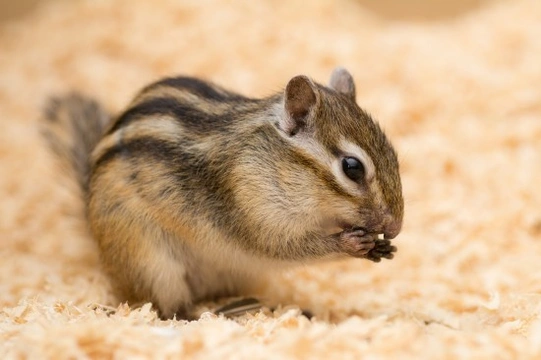
Chipmunks as Pets: Care Guide & Considerations
These days many people choose tend to keep more exotic pets and with such a wonderful choice from rare tropical fish, large reptiles to tiny amphibians, it's easy to see why. However, if you're more of a cute and furry"" creature fan, then you may want to think about sharing your home with some delightful Chipmunks and they might well fit the bill perfectly.
Chipmunks are cuter than cute with their stripes and funny little antics. They originate from North America although the Siberian Chipmunk is native to Asia. These little creatures are very active during the day, living on the ground and digging deep burrows which they live and breed in. They are also very able climbers and love to forage in bushes and trees. In captivity, Chipmunks have been known to live for up to 10 years although it is more usual for them to boast life spans of 5 to 7 years.
Chipmunks Need Lots of Space to Stay Healthy
However, because they are so busy, they need to be kept in a large environment so they can rummage around and do all the things they would typically do in the wild. If they don't get the exercise they need, Chipmunks run the risk of developing certain disorders, one of which is a condition known as Stereotypical Movements.
Healthy Chipmunks are always active with bright eyes and a nice shiny coat. Typically, they gain weight during the autumn, even in captivity because this is in preparation for their hibernation and therefore Chipmunks need extra reserves to get them through their dormant period.
Examining a Chipmunk Can be Tricky
Because Chipmunks don't particularly like being picked up and handled, it makes it hard to examine them. For this reason, it's really important to keep a watchful eye on how they move around so that if anything untoward is going on health-wise, you'll notice the difference in their behaviour sooner rather than later.
Much like with chickens, if you do need to pick your pet up in order to examine it more thoroughly, this is best done in the evening when the light is dim. However, you should always wear a pair of thick gloves because even the tamest of Chipmunks will turn round and nip you if they are feeling unwell or have suffered some sort of injury. You also need to be careful when examining a Chipmunk because they are so quick which means there's a risk of them escaping from your hands.
If you have a real problem catching your pet and examining them but you are concerned about your pet's health, you should talk to your vet sooner rather than later. However, before you decide on getting some Chipmunks, you would need to check your local vet would be willing to treat them should they fall ill as not all vets are familiar with them.
Choosing Your Chipmunks
When choosing Chipmunks you have to be careful because if you put couples together or a group, all too often when forced to live in the same environment, Chipmunks start to show aggression towards each other. This can lead to some nasty fighting which could prove fatal. It is far better to put two males together right from the start and avoid having two females in the same environment. However, the personality of each Chipmunk comes into play so there is never a guarantee they will get on.
Common Illnesses That Affect Chipmunks
You need to keep a close eye on Chipmunks for signs of injury or illness. Common complaints and conditions include the following:
- Skin conditions – skin inflammation
- Stereotypical movements
- Unusual swellings
- Parasites
- Fungal Infections
- Diarrhoea in chipmunks
- Elephants teeth
- Colds and pneumonia
- Fractures
- Bite Wounds
By watching your pets regularly you'll soon get to know each of their characters and habits which is important because it means that if things aren't quite right, you'll pick up on this sooner rather than later. Typical signs to watch out for that something may be wrong could well include the following:
- Change in coat appearance
- Lethargy
- Increased or decreased thirst
- Signs of pain/Sensitive to touch
- Watery eyes and/or runny nose
- Limping
If your pet shows any of the above symptoms or signs of being unwell, you would need to get them to the vet as soon as you can. You must never give a Chipmunk any medication that is for use on any other animal because it could prove fatal to them.
Conclusion
If well cared for Chipmunks can live long and very happy lives which they don't get the chance to do in the wild. If they fall ill or are weak in any way out in the wild they fall prey to their many predators. Older Chipmunks tend to have duller coats which turn grey with age and they are generally less active than their younger counterparts. It's important to check with your local vet before deciding to keep Chipmunks as pets, because even today, a lot of vets are not familiar with them and you need to be certain that if any of your pets fall ill, they will be able to treat them.
""



